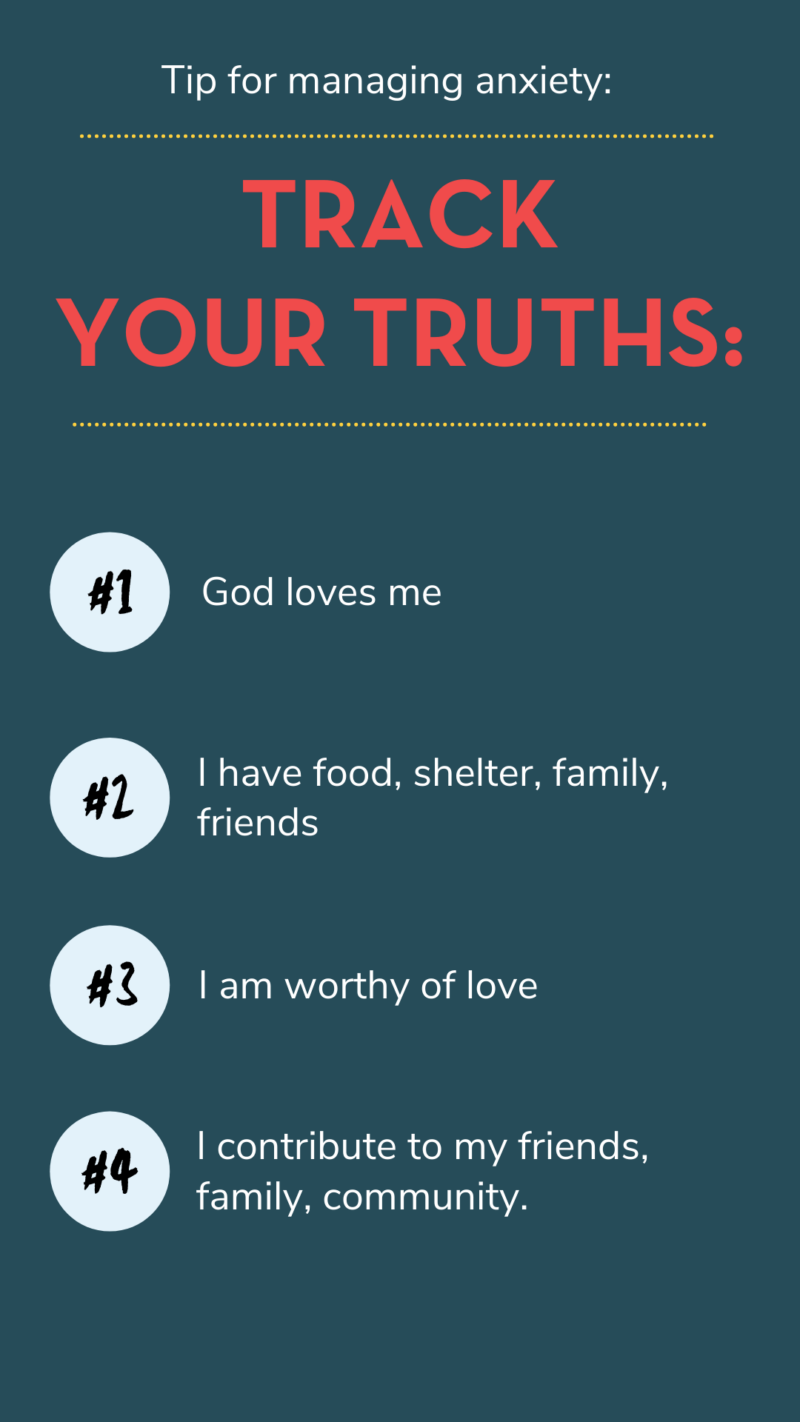
While 2020 is over, the effects of the year’s events are lingering. Everyone has lived through a year of stress, anxiety and grief.
And it was hard.
In December 2020, we sat down with Zhela, a licensed therapist through the Trinity Counseling Center to ask some questions and seek advice for attending to our mental health, including depression, anxiety, grief and helping our kids cope with their own 2020 experiences.
Tell me a little about your experience working as a therapist during 2020. What have you observed?
Z: Whatever people have been experiencing, it’s been exacerbated. Now it’s like a pressure cooker … You’ve recognized you’re a little bit powerless and hopeless, so that’s pushed people to really seek out help, which is excellent.
When you’re used to a pattern of seeing people on a daily basis, and now you’ve lost all that support and you’re isolated with someone you live with, that’s difficult. You recognize all the depression (or anxiety) you really do have is now facing you (because of the isolation).
The pandemic has pushed people to call (our counseling office) because of the isolation and dealing with their own set of heaviness from their own mental health issues.
How can parents talk to their children about emotions like anxiety and grief?
Z: I can’t stress enough the need for parents to continue to connect emotionally and create a safe space for all of their relationships but definitely for their kids.
If they notice they are not performing well (in school), that’s a symptom that something is going on in many ways. If they don’t feel connected emotionally, then it’s harder to do anything, any work.
What I recommend is empathizing with them, connecting emotionally with how they are feeling. Have them process what they are feeling.
And, most times what we are all experiencing as a collective human race is grief. We have to be able to grieve with our kids some of the losses or a lot of the losses they are experiencing as well as their own grief.
Being able to name what you’re feeling (and) all the emotions that come with it and empathize and just grieve with your kids.
It’s so important that parents grieve with their kids. That’s the biggest thing.
Action steps from Zhela for talking with kids about feelings:
- Begin with what they are feeling and what they are most upset about and empathize.
- Acknowledge the losses and all the emotions that come with it.
- Be able to eventually get to a place of acceptance and what that means for them.
How can you cope with grief right now?
Z: It helps to get support. If you can find someone with whom you can share what you are feeling, that someone can simply validate and hear that you’re upset and sad about it.
To have the presence of someone to validate and be in the presence of someone else is so healing just to acknowledge you do see my pain you do see my sadness and my mourning, my anger about that and they can just go “I see that; I hear that.”
 It’s helpful to surround yourself with someone—a safe person—that you can share that with, (who is) not there to fix it, they are just there to listen.
It’s helpful to surround yourself with someone—a safe person—that you can share that with, (who is) not there to fix it, they are just there to listen.
In the grief process, acknowledge how you are feeling and sit with that feeling and let it pass.
God encourages us to lament and cry over things because there is a season for it. We are meant to do that. So acknowledge the loss and acknowledge the pain of that and then when you do it makes room for joy and happiness and contentment and what God has next or what is next for you to see.
An action step from Zhela for coping with grief:
Write a grief completion letter for yourself (not to be delivered to someone). Write a letter to a person you are mourning, whether deceased or someone from a broken relationship, including:
- Apologies to the person
- Forgiveness of the person. Make a list of all the things you forgive that person for.
- Express any other feelings toward that person.
Share this letter with another person who will simply listen, but do not deliver to a specific person associated with a relationship you are grieving.
COIVID-19 has caused extra anxiety. How can you maintain your anxiety?
Z: Be able to acknowledge that is what you are feeling. Sit with it, find out what you think you need or want.
Be able to express what you need or what. Feeling that emotion that it is what you are feeling.
People think about something that could happen and there is some unknown. The Bible says to focus on what is true, noble, pure, etc. (Philippians 4:8).
Name what you are grateful for and embrace your feeling of gratitude. Getting to fear vs. getting to gratitude is not the same neurologically. If you go toward gratitude, giving thanks in all things … science shows that your brain can’t even move toward fear.

Action step from Zhela:
Write a list of truths, such as:
- God loves me
- I have a place to live
- I have friends/family who care for me
- Etc.
Make a list of things you are thankful for each day, such as:
- A good cup of coffee
- your favorite food
- Time with friends
What are some tips for someone coping with depression right now?
Z: Name the emotion.
People with depression have a hard time accepting something about themselves or a circumstance or reality.
One big piece is to move into something.
Your body helps activate you to get more oxygen into your brain and create more energy with you. Getting some kind of routine in your life — such as making eggs or going to the mailbox — do something that gets your body moving.
Action steps from Zhela:
- Create something routine. This can be as simple as making breakfast in the morning or walking out to the mailbox in the afternoon.
- Identify what you are feeling.
- Create your favorite playlist that makes you feel good.
- Eat well, sleep well, move your body
- Write down what you are thankful for throughout the day

Do you have any general mental health advice?
Z: Nurture strong relationships. Those are the people you go to at 2 a.m. when you’re falling apart. Who are your 2 a.m. friends you can call? Be able to identify those and nurture those.
Nurture mentorship relationships and become a mentee. Become a mentor and mentor others. That’s discipleship.
Make friends, build friends, because in many ways it will help you build resilience.
How can we maintain a relationship with god when we coping with stress, anxiety and grief?
Z: Receiving grace, receiving healing from God — it’s an opportunity to lean into the Lord and the Word. There is research that shows prayer is beneficial. Leaning on your faith, believing that He wants you restored.
God is in the business of restoration.
When or why would you recommend someone to seek professional help? Is it OK to have a therapist and Jesus?
Z: I think everyone should see a therapist.
Most people go because the fire alarm inside of them has been going off for too many weeks. Normally people call because they are too desperate. I would say be preventative. If you’ve had any trauma, broken relationships — if you’ve been disappointed or had trauma or grief in your life, I think it’s always good to go see a therapist, seek counseling.
If you notice you avoid things, either people and it’s almost always people, and situations, go see a therapist because you’ve been disappointed, you’ve been hurt.
Jesus was not shocked about things that were disappointing — he expected it.
We are mind, body spirit, so there are also areas in our life where we have to address the clinical areas, too.
You used to see right or you don’t see very well, does that mean you don’t need glasses? You need something just to use as support to be able to see better.
Jesus allowed Namaan to dip seven times in the Bethesda pool. He could have healed him right there, but he told him seven times … Jesus also required people to do things to get themselves healed.
Resources for mental health from Zhela:
- Boundaries by Henry Cloud and Boundaries.me
- Take Your Life Back by Stephen Arterburn
Coping with Stress, Anxiety, Grief
As we move forward into a new year, move forward in healing. If you or someone you love could use some care or prayer, reach out to the staff at Shepherd’s Gate Church. Visit our Mental Health Resources page for more information and tools for yourself and others.
We encourage you to lean into God as you seek relief and healing for your mental health. You are not alone. God hears you and knows what you are going through. For more information on connecting with God, check out some of our other related articles:
- Tips for How to Pray
- How to Read the Bible
- Ideas for Helping those Who are Grieving







